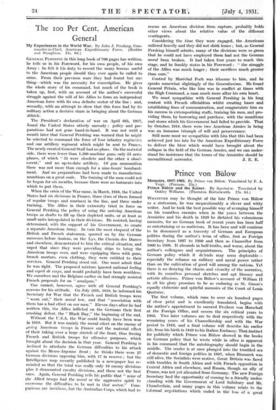The ioo Per Cent. American General
GENERAL PERSHING in this long book of 700 pages has written, he tells us in his Foreword, for his own people, of his own
Army : he felt it his duty to record the many lessons useful to the American people should they ever again be called to arms. From their previous wars they had learnt but one
thing—which was the necessity for conscription. He gives the whole story of his command, but much of the book is taken up, first, with an account of the author's successful
struggle against the will of his Allies to form an independent American force with its own definite sector of the line ; and, secondly, with an attempt to show that this force had by its military action a decisive share in bringing about the German &Ude.
The President's declaration of war on April 6th, 1917, found the United States utterly unready : policy and pre- parations had not gone hand-in-hand. It was not until a month later that General Pershing was warned that he might be selected to command the force of four infantry regiments and one artillery regiment which might be sent to France. The newly created General Staff had no plans. On the material side, there were fewer than 1,500 machine guns, only 55 aero- planes, of which "51 were obsolete and the other 4 obso!- eseent," and no up-to-date artillery. Of gun ammunition there was not more than enough for a nine-hours' bombard- ment. And no preparations had been made to manufacture munitions on a great scale. The training of the men could not be begun for six months, because there were no hutments into which to put them.
When the crisis of the War came, in March, 1918, the United States had six divisions in France, three (two of them formed of regular troops and marines) in the line, and three under training. The Allies in their extremity tried to force on General Pershing the policy of using the arriving American troops as drafts to fill up their depleted units, or at least as small units interpolated in their divisions. He resisted, having determined, with the support of his Government, to create a separate American Army. In vain the most eloquent of the British and French statesmen, spurred on by the German successes before Amiens, on the Lys, the Chemin des Dames and elsewhere, demonstrated to him the critical situation, and urged that since they were providing ships to bring the American troops over, and were equipping them with guns, trench mortars, even clothing, they were entitled to their services. General Pershing stood out. One must admit that he was right. The proposed mixture ignored national feeling and esprit de corps, and would probably have been worthless. We ourselves and the Belgians earlier on had strongly resisted French proposals for an "amalgam."
One cannot, however, agree with all General Pershing's reasons for his attitude. On July 26th, 1918, he informed his Secretary for War that the French and British troops were "worn out," their moral low, and that "association with them has a bad effect on our men." Eleven days after he had written this, the Allies inflicted on the Germans their first crushing defeat, the "Black Day," the beginning of the end.
Without the U.S.A. the War could hardly have been won in 1918. But it was mainly the moral effect on the enemy of &ming American troops in France and the material effect of their taking over a large stretch of the front, thus freeing French and British troops for offensive purposes, which brought about the decision in that year. General Pershing is inclined to attribute the German difficulties to his attack against the Meuse-Argonne front ; he thinks there were 27 German divisions opposing him, with 17 in reserve ; but the Intelligence map recently published in a newspaper has re- minded us that the total was really only 16 enemy divisions plus 8 dismounted cavalry divisions, and these not the best ones. Again, General Pershing tells his public that "none of the Allied troops had the moral or the aggressive spirit to overcome the difficulties to be met in that sector." Com- Parisons are invidious, but the Australian Corps, which had to
rescue an American division' from capture, probably holds other views about the relative value of the different contingents.
Considering the time they were engaged, the Americans suffered heavily and they did not shirk losses ; but, as General Pershing himself admits, many of the divisions were so green that he could not have employed them had not the German moral been broken. It had taken four years to reach this stage, and he frankly states in his Foreword : "the struggle of the Allies was much longer ; their sacrifices much greater' than ours."
Control by Marechal Foch was irksome to him, and he speaks somewhat slightingly of the Generalissimo. He found General Petain, who like him was in conflict at times with the High Command, a man much more after his own heart.
We must sympathize with General Pershing in his long contest with French officialdom whilst creating bases and. establishing lines of communication, and congratulate him on his success in extemporizing staffs, training his men, and pro- viding them, by borrowing and purchase, with the munitions and stores which his Government had failed to provide. That by October, 1918, there were two American Armies in being was an immense triumph of will and perseverance.
Still more must we sympathize with him that this had been achieved just too late for the American Expeditionary Force to deliver the blow which would have brought about the collapse in the field of the German Armies, and we can under- stand his insistence that the terms of the Armistice should be










































 Previous page
Previous page